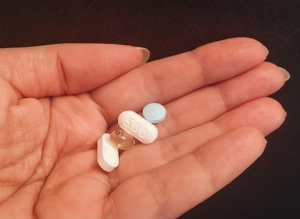How to live a full life with diabetes
Published 27 Jun 2016

With the right management, people with diabetes can have a healthy lifespan
Anna Magee, Telegraph Health Features Editor says:
Millions of people in the UK live with diabetes, but if you’ve just been diagnosed – or you think you might be at risk – there’s good news. With the right annual checks, lifestyle and, for some people, medication, there is no reason why people with diabetes can’t live a long and healthy life.
First, a few simple tests with your GP, which are also provided by some pharmacies, can help detect type 2 diabetes and help ensure you receive early care, and second, diabetes is one area where a healthy diet and exercise can make all the difference to risk.
The two types
Each time you eat, your body breaks down food, and glucose is released into the bloodstream. Insulin is a hormone the body makes to process that glucose and deliver it to all cells including muscles and liver.
Type 2 diabetes develops when the body can still make some insulin but not enough, or when the insulin it produces doesn’t do its job.
Type 1 diabetes, which is much less common, develops when insulin-producing cells in the pancreas stop working. It usually strikes before 40 and can’t be prevented. People with type 1 need insulin injections for life.
Are you at risk?
If you have a parent or siblings with type 2 diabetes or are overweight, it’s important to be aware of the symptoms to watch out for and to talk to your GP or pharmacist about your risk of developing the disease.
There are other risk factors. For anyone over 40 and with risk factors, an annual test for type 2 is a good idea.
According to Diabetes UK, 80 per cent of cases of pre-diabetes can be prevented from becoming type 2 with diet and lifestyle changes.
Managing type 2 diabetes
If you have been diagnosed with type 2 diabetes, make sure you get the right checks to avoid complications. They can be serious but are largely preventable with regular checks of blood pressure, blood glucose levels, cholesterol and kidney function, eye screening and leg and foot checks.
A Mediterranean diet could reduce risk of developing diabetes
Diabetes UK states that in the past decade cases of type 2 diabetes have increased by 65 per cent and one of the causes is the increase in our waistlines.
The upside is that by losing five to 15 per cent of body weight an overweight person can dramatically lower their risk of going on to develop type 2 diabetes.
Likewise, weight loss can make a big difference to those already diagnosed. There’s no need to starve.Research published in the British Medical Journal showed a Mediterranean diet of lowered red meat intake and more fruits, chicken vegetables, fish and polyunsaturated fats such as olive oil, olives and nuts could reduce risk of developing diabetes.
One study in the Annals of Internal Medicine found that a Mediterranean diet was better at controlling type 2 diabetes than a low-fat diet.
Exercise has been shown to help improve blood sugar control and insulin sensitivity in those with diabetes. A large-scale study published in May analysed data over 20 years from more than 4,000 people and found that those who did cardiovascular exercise five times a week for 30 minutes a day had the lowest risk of developing type 2.5
Angela chalmers, Boots pharmacist, says:
Whether it’s in magazines, on the radio or when chatting with friends, diabetes is a widely discussed subject, which is no surprise as around four million people in the UK suffer from it.
As a Boots pharmacist I speak to so many people who still find it a very confusing topic and are unsure about the differences between type 1 and type 2 diabetes.
Most people suffer from type 2, which can be prevented if you have a healthy lifestyle. Only about 10 per cent have type 1, which tends to be genetic.
Ask your local pharmacist
Your Boots pharmacist can help with advice if you or a member of your family is diagnosed with diabetes.
A healthy diet and lifestyle will help manage symptoms
We can advise on managing medication and which over-the-counter medicines are safe for you to buy. We can chat through your symptoms and suggest seeing your GP if needed.
I speak to a lot of people who are worried they might have diabetes. In fact more than half a million people in the UK suffer from it and haven’t been diagnosed.
If you’re worried, pharmacists, including those at Boots, can tell you which symptoms to watch for.
These can include: urinating more than usual (especially at night), being really thirsty, feeling more tired, losing weight without trying to, genital itching or thrush, blurred vision and cuts and wounds taking longer to heal.
Nutrition matters
We can also give nutritional and lifestyle advice, to help prevent type 2 diabetes developing. Your local Boots pharmacist can provide healthy eating advice, from helping ensure you get your five-a-day, to eating lower-GI carbs to keep blood sugar stable and helping to keep cholestrol in check.
They can also support you with choices around safer alcohol consumption and stopping smoking as well as tips on getting more active.
For those who have type 1 or type 2 diabetes, a healthy diet and lifestyle will help manage symptoms, and your local Boots pharmacist will be able to suggest helpful changes.
They can also advise on the different products available to help you manage your diabetes, such as blood-pressure monitors, circulation boosters, blood glucose monitors and test strips.
The best thing is to prevent where possible. We can guide you on how to do this by losing weight, reducing sugar intake, exercising more and cutting down or giving up smoking.
To find out more about managing diabetes, visit Boots.com, where you’ll also find our online diabetes shop with details of helpful products
1
Telegraph
12 comments


 Facebook
Facebook Twitter
Twitter






